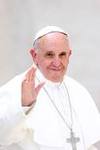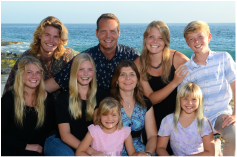 Pope Francis Visits Cuba and The United States of America From September 19th until September 27th, Pope Francis will be visiting Cuba and the United States of America. For many reasons, his visit to these two nations is historic and perhaps controversial. Who is the Pope? The Pope is not just a person, but is called the Vicar of Christ for over 1.2 billion Catholics (that’s 1,200,000,000 people). The word “vicar” means earthly representative of God or Christ. Catholics believe that when Jesus Christ walked the earth, he chose a leader to guide Christians after he was to be crucified. Catholics refer to Bible passages to support this view, including Mathew 16:18. After Peter died, early Christians chose a new leader. Pope Francis is the 266th Pope in the history of the Church. When the Pope speaks, he speaks not only for himself, but for all Catholics of the world. There are 801 million (that’s 801,000,000 people) Christians in the world today who do not believe the Pope is the leader of the Christian people. In 1053, within the Christian Church, there was a schism. A schism means a separation. The Christian Church divided in two, between the Roman Catholic Church and the Eastern Orthodox Church. The Eastern Orthodox Church did not accept the idea that the Pope was leader of the Christians on Earth. Then, in 1527, Martin Luther separated from the Roman Catholic Church, forming the Lutheran Church. This was the beginning of the Reformation. After this separation was made, hundreds of other Christian religions separated from either the Lutheran Church or the Roman Catholic Church. Faiths that separated from the Catholic Church do not hold that the Pope is leader of the world’s Christians. The Pope and Cuba Since 1959, people of religious faith have been persecuted on Cuba. Fidel Castro installed a Communist government in Cuba, and Communist countries outlaw religious belief. Christians have been oppressed, tortured and executed on Cuba since this time. However, in recent years, the Communist regime of Castro may be softening its stance towards religion. Pope Francis has worked to bring greater freedom to the religious people of Cuba. He brokered the deal between the United States of America and Cuba that improved diplomatic relations between the two countries. Raul Castro, the current Communist dictator of Cuba, will attend all three Masses the Pope will celebrate, and the dictator has said he may go back to the Church. The Pope and the United States of America Pope Francis will be in the United States of America from September 22nd until September 27th. His visit marks a few “firsts.” For the first time in history a Pope will address all members of Congress. This will take place 10:00 a.m. EST. Pope Francis will also canonize the first Spanish-American saint of North America, proclaiming Father Junipero Serra a saint on September 23rd at the National Shrine of the Immaculate Conception in Washington, D.C. Both events are marked with great interest and some controversy. The Pope and the U.S. Congress Many are waiting with keen interest to listen to what Pope Francis will say to the U.S. Congress. The Pope has made statements that seem very critical of free market principles, which is favored by the Republican Party. He also has written and spoken about global warming, which is a favored topic of Democrats. On the other hand, he has confirmed the Catholic Church’s stand against abortion, which is a procedure nearly all Democrats believe to be a right of women. And, he has spoken against euthanasia, which more Democrats support. The Church and Father Junipero Serra The Catholic Church proclaims a person to have been a saint if he or she lived an exemplary life for Christ, and, if two miracles can be attributed to this person after he or she has died. For example, if a believer asks a person he believes to be in heaven to pray for him, and the believer is healed of an incurable disease, the Church believes this may be a miracle. During his visit to the U.S.A., Pope Francis will be proclaiming Father Junipero Serra a saint. Father Junipero Serra is somewhat of a controversial figure. Father Serra was a Spanish Franciscan priest who founded nine of California’s 21 missions from 1769 to 1782. Because of Serra, thousands of native Americans learned about Christ, were baptized, and learned trades that would help them in the new economy the Spanish brought with them when Spain colonized California. Once baptized, the Indians were not allowed to leave the missions, and when they broke laws or Church rules, Indians were physically punished, as was the custom in medieval Europe. On one hand, Father Serra is revered as a Christian who gave up worldly comfort to teach about Christ in a new land, but on the other hand, some believe he mistreated the Indians and should not be exalted. Questions: 1. What is the Catholic view of who the Pope is? 2. What happened in the year 1053? 3. What happened in the year 1527? 4. Since 1959, who has been in control of Cuba and how does this group treat believers in God? 5. What are the two different views of Father Serra?
2 Comments
9/24/2015 02:44:37 pm
Re: "Pope Francis and His American Visit", you may want to check out EWTN.com or watch EWTN if you have cable tv for the Catholic perspective instead of the secular media for what's important about the pope's visit. The paragraph on "Who is the Pope?" misses some important distinctions, like the fact that the split between the Eastern and Western churches didn't come out of nowhere in 1054, nor was it formalized until centuries later, and at no point did it involve the rejection of apostolic Christianity that the Reformation did. The split between East and West did not involve a rejection of the Petrine office of the popes, nor did it involve a rejection of the sacraments, the priesthood, devotion to our Blessed Virgin Mary, etc. In reality, the split between the East and West was a slow-growing rift that important figures on both sides only gradually became aware of btwn the 9th and 11th centuries. It was healed at several points in the Middle Ages but the underlying issues have proven hard to solve in a permanent way. The "Eastern Catholic Churches" in contradistinction to the "Eastern Orthodox Churches" have found their way back into Catholic communion, despite still having their reservations abt how papal leadership ought to function in practice. The rejection of the papacy by Protestants was a totally different thing, part of a much broader rejection of the the ancient sacraments and faith that had been handed down through the centuries. I encourage you to read Dr. Warren Carroll's book The Cleaving of Christendom.
Reply
John De Gree
9/25/2015 07:37:17 am
Thank you Kathy very much for educating all of us! Your comments are very appreciated.
Reply
Leave a Reply. |
John De GreeJohn De Gree writes the current events with a look at the history of each topic. Articles are written for the young person, aged 10-18, and Mr. De Gree carefully writes so that all readers can understand the event. The perspective the current events are written in is Judeo-Christian. Receive Articles and Coupons in Your EmailSign Up Now
For Email Marketing you can trust. Archives
June 2024
Categories
All
|
|
SUPPORT
|
RESOURCES
|
|


 RSS Feed
RSS Feed



